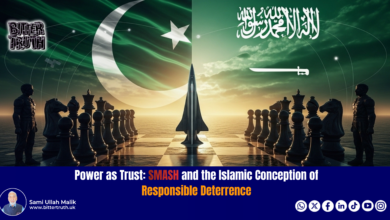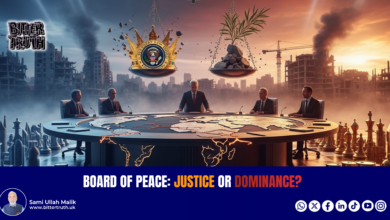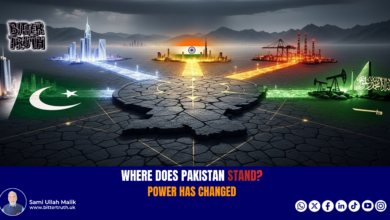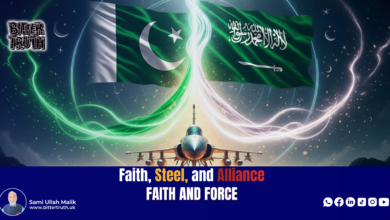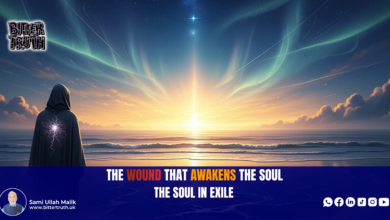The seat of enlightenment is in the hands of clowns
Kashmir: Memories of the Past and the Current Situation
Currently, the Muslim Ummah is the most afflicted community in the world, besieged by a deluge of trials and tribulations from all directions. Our enemies are not only united in their practical conspiracies to annihilate Muslims but have also left no stone unturned in making us enemies of one another. Consequently, we remain engrossed in cutting each other’s throats.
Although the Muslim Ummah is grappling with numerous issues, Kashmir and Palestine have become two major killing fields where humanity has been wailing incessantly for the past seven decades. Yet, the nations that pride themselves on being civilised are not only playing the role of deaf and mute devils but are also complicit in these atrocities.
The Kashmiris and Palestinians are enduring catastrophic suffering, but it is profoundly regrettable that the gatherings of our Muslim rulers are flourishing in apathy. What has become of us? Such callousness was never seen in the community before. True, we are weak today and incapable of providing practical assistance, but the least we can do is to preserve this pain as a trust, safeguarding it for future generations. Perhaps our progeny will not be as helpless as we are. Times can change, after all. At the very least, we can keep our wounds fresh until the tides turn, ensuring the blood from these injuries does not clot.
There was a time when the seat of enlightenment had not fallen into the hands of jesters. Our literary figures, unconcerned with the divides of left and right, were passing this trust on to future generations.
Names such as Iqbal, Qudrat Ullah Shahab, Faiz, Shorish Kashmiri, Intizar Hussain, Habib Jalib, Ahmad Nadeem Qasmi, Ibn-e-Insha, Ahmad Faraz, Rais Amrohi, N.M. Rashid, Mustansar Hussain Tarar, Qurratulain Hyder, Mazhar-ul-Islam, Ada Jafri, Yusuf Zafar, Manzoor Arif, Zameer Jafri, Khateer Ghaznavi, Mahmood Shaam, Nazir Qaiser, Shorish Malik, Sultan Rashk, Tahir Hanfi, and Balqis Mahmood are but a few of the many figures from my country who immortalised this pain in their stories and poems as a legacy for future generations. But that was a different time.
Now, when smoke rises from Palestine, my pen instinctively writes elegies, but I wonder—where are the other writers? Have their pens broken? Has the ink dried up? Or has the sense of empathy itself perished? Years ago, I read Intizar Hussain’s story Sharm-ul-Haram; certain sentences from it still resonate in my heart:
“Who resides in Bayt al-Maqdis? It is I, it is all of us, and it is no one. Children have been shattered like clay pots crafted by a potter. Virgins tremble like the rope of a falling bucket into a well. Their garments are torn, their hair dishevelled. Even the sun had never seen them uncovered. The brave sons of Arabia lie in the fields like tall palm trees, while the desert winds mourn over them.”
I have read Intizar Hussain’s story Kane Dajjal countless times. This paragraph always brings tears to my eyes: Seated on the bed, Amma Ji began chopping betel nuts and started weeping. She placed the cutter on the tray and wiped her tears with her scarf. Abba Jan’s voice choked but he maintained his composure and began in his dignified tone: ‘The Prophet (peace be upon him) passed through rivers, mountains, and deserts. He stopped at Masjid al-Aqsa. Angel Jibreel (peace be upon him) said, ‘O Prophet (peace be upon him), please proceed.’ The Prophet (peace be upon him) asked, ‘To where?’ Jibreel (peace be upon him) replied, ‘O Prophet (peace be upon him), the journey across the earth is complete. This is the final destination; now begins the journey to the celestial realms.’ The Prophet (peace be upon him) ascended and continued to ascend…” And raised high for you your repute… وَرَفَعْنَالَكَ ذِكْرَAbba Jan lowered his head, took a deep breath, and said, “Where our Prophet ﷺ ascended, we descended.”
Childhood turned into youth, and youth has begun to fade. The hair at my temples is now turning grey, and Aisha chirps, “Baba, you’ve grown old.” Yet, this sentence remains embedded in my being like the sharp tip of a spear: “Where our Prophet ﷺ ascended, we descended.”
Decades ago, when I first read this sentence, I couldn’t continue reading. Even today, when I reach this point, a haze descends over my eyes. The radiant and resolute face of Syed Ali Geelani appears before me, and in shame, I set the story aside. It feels like the predicament described by Munir Niazi:
“Afterwards, a long silence, and the roar of a fierce wind.”
The entire vigour of contemporary enlightenment seems to be in growling and raging against Muslims. Yet I speak of better times, when the seat of enlightenment had not yet fallen into the hands of jesters. Back then, when Faiz Ahmed Faiz wrote an anthem for Palestinian freedom fighters, he chose a verse from the Quran as its title:
Abba Jan lowered his head, took a deep breath, and said, “Where our Prophet ﷺ ascended, we descended.” Childhood turned into youth, and youth has begun to fade. The hair at my temples is now turning grey, and Aisha chirps, “Baba, you’ve grown old.” Yet, this sentence remains embedded in my being like the sharp tip of a spear: “Where our Prophet ﷺ ascended, we descended.”
Decades ago, when I first read this sentence, I couldn’t continue reading. Even today, when I reach this point, a haze descends over my eyes. The radiant and resolute face of Syed Ali Geelani appears before me, and in shame, I set the story aside. It feels like the predicament described by Munir Niazi:
“Afterwards, a long silence, and the roar of a fierce wind.”
The entire vigour of contemporary enlightenment seems to be in growling and raging against Muslims. Yet I speak of better times, when the seat of enlightenment had not yet fallen into the hands of jesters. Back then, when Faiz Ahmed Faiz wrote an anthem for Palestinian freedom fighters, he chose a verse from the Quran as its title: أَلَا إِنَّ أَوْلِيَاءَ اللَّهِ لَا خَوْفٌ عَلَيْهِمْ وَلَا هُمْ يَحْزَنُونَ Unquestionably, [for] the allies of Allah there will be no fear concerning them, nor will they grieve.
Reflection
Read Ibn-e-Insha’s Deewar-e-Girya, look at Faiz’s Sar-e-Wadi-e-Seena, cast an eye on Ada Jafri’s work about Masjid Al-Aqsa, observe the stains in Manzoor Arif’s Aaina, consider Ahmad Faraz’s portrayal of Beirut, Rais Amrohi’s Fidya, and Mahmood Sham’s Bint-e-Aqsa. In every line, you will find this pain afresh. They passed on this anguish as a trust to future generations. But why is there such a dearth of capable individuals today? This is not just my question but also that of my Mujahid sister Syeda Asiya Andrabi, enduring hardships in India’s infamous prison, along with her companions Faheema and Nasreen. And I, ashamed, have no answer for them. From where can I find an answer?
For years, we appointed to the Kashmir Committee a religious scholar who openly stated, “We had no role in the mistake of creating Pakistan,” yet he and his relatives comfortably availed every privilege from Pakistan’s national treasury.
خود بدلتےنہیں، قرآں کو بدل دیتے ہیں
ہوئے کس درجہ فقیہان حرم بے توفیق!
“They do not change themselves but attempt to alter the Quran,
How unfortunate the jurists of the Haram have become!”
We, with our hands on our hearts, once declared before thousands that we were advocates for Kashmir, announcing symbolic protests every Friday afternoon for Kashmir’s freedom. But what happened? A few minutes of a photo session, and the advocates disappeared. We even forbade raising the slogan of Jihad for Kashmir. Did those claiming to turn Pakistan into a state like Medina not consider that to establish Medina as an Islamic welfare state, the Holy Prophet ﷺ himself had to engage in practical jihad at Badr, Uhud, and many other battles?
I find no words to express my pain and grief. Is he now, in Adiala Jail, reflecting on how betrayal of the Kashmiri martyrs during his tenure in power has led to such a fate? This world is a place of lessons; others too will not escape this reckoning.
This trust does not only carry the burden of pain but also the hope for changing times. Read the final paragraph of Mustansar Hussain Tarar’s Khana Badosh:
“I had met hundreds of Palestinians, but Ahmad was a different man. He spoke of Israel with disdain, not emotionally, but with a flat, businesslike tone. For him, the homeland was like a kidnapped child, unattainable through mere sentiment. One had to remember its traces and reach the scavenger’s camp through cold, calculated planning.”
We are forgetting these traces. How are they remembered? Mothers’ lullabies keep them alive; educational curricula remind us of them, and writers and poets refine these memories. But now, mothers have no time, fathers are oblivious to what Palestine or Kashmir even means, education has become alien, and writers and poets have fallen silent.
There is an onslaught that has engulfed everything. Speaking of Palestine now is deemed an outdated stance because the Arabs, who once called themselves Palestine’s advocates, have not only lost the case but also absolved themselves of this advocacy, unwilling to even hear its name. Their priorities are to prolong their rule, secure national wealth in foreign treasuries for hard times, and avoid the fates of Saddam, Qaddafi, and Bashar al-Assad.
But they forget that once a sheep is slaughtered, it does not matter to it whether its meat is diced or minced. The countries that call themselves the “mothers of democracy” strangled the democratic aspirations of Egypt and Algeria with their own hands. The treatment of Morsi’s government by these champions of human rights will surely shame future generations. Iraq, a land with a history spanning thousands of years, from Babylon to Nineveh, was devastated, eclipsing even the savagery of the Mongols.
After killing over 125 million people in two world wars, the decision was made to play this bloody game of fulfilling interests in the Third World, especially in Muslim countries, under the guise of “pre-emptive defence.” Iraq saw over a million people massacred, families torn apart, and a people who once took pride in their lineage now forget both their history and geography.
America and its allies, having looted these nations’ resources, now stand to teach lessons in humanity. What name will they give to their plunder and destruction, from the Red Indians to “Operation Enduring Freedom”? Arab monarchies face criticism, but their rulers are still greeted on red carpets, silencing democracy itself.
In the West, individual freedoms have become a challenge. A woman may have the right to undress, but she cannot wear a scarf of her choice. Religion is insulted without a moment of shame. Afghanistan was turned into a battlefield for 40 years—first as a pawn against the Soviet Union to achieve superpower status, and later under the pretext of 9/11 for 11 years of inhumane violence, only to eventually leave with the ignominy of retreat etched into their history.
Yet even before they caught their breath, war camps were set up in Ukraine. Who doesn’t know that under the pretext of the Arab Spring, Qaddafi was punished for resisting economic ties with the U.S. and Western powers? Ostensibly, Libya was attacked to “save its people from Qaddafi,” but the reality was that Qaddafi aimed to introduce a gold-backed currency for oil trade, challenging the dominance of the dollar.
The entire Arab and Islamic world watched as Qaddafi’s house was bombed and his family killed, yet they could do nothing. It was blatant aggression under the guise of saving the Libyan people and a stark reminder to all Muslim leaders of their limits. This silence from the West weighs heavily on their collective conscience. Even many Western intellectuals have admitted this crime to me.
At last, India’s filthy, decayed, and tyrannical treatment of its minorities has been condemned by 75 members of the U.S. Congress, who wrote a letter to Joe Biden, spitting on India’s democracy. But did the so-called champions of democracy hear any protests? Syed Ali Geelani, in his autobiography “On the Shores of Volar Lake”, refrains from displaying the wounds of his heart, but subtly points to eye-opening scenes between the lines. Sitting on the chest of the Indian usurers, and amidst his millions of followers and martyrs, he publicly declared, “We are Pakistanis, Pakistan is ours,” yet we deceived him by posing as Kashmir’s lawyer. Is it the fault of the Kashmiris that they are among the few determined, courageous, righteous, freedom-loving, and independent nations that have not been intimidated by the brutality of over 800,000 Indian predators, nor bowed down to their aggression? From 1947 to the present day, their lives have been made unbearable, a continuation of Hindu usurer Dogra rule. The nameless mass graves, innocent martyrs, orphaned children, widows, half-widows, blind children, young, disabled and helpless old people, and the bloodstained Kashmir valley stand as living proof of Indian atrocities. Yet, they still demand their rightful due from the United Nations, the world’s largest institution, which has now become a puppet of the great powers, despite the promise made to them as a guarantee by the world’s major powers through their unanimous agreement. Even today, the Kashmiris, deprived of basic human rights, are trying to shake the conscience of the world with silent tongues, blind eyes, bleeding wounds, ravaged honor, and helpless hands, carrying the bodies of young martyrs in a hopeless yet hopeful struggle.
In 1948, the United Nations issued a Universal Declaration of Human Rights with the consent of 48 nations, consisting of 30 articles. To ensure the protection, improvement, and enforcement of this declaration, a permanent Human Rights Commission was also established. The Universal Declaration of Human Rights ensures fundamental rights such as liberty, equality, free movement, freedom of expression, dignified living, social protection, religious freedom, and protection from torture, cruelty, and inhumane or degrading treatment or punishment. Although voices have been raised against human rights violations occurring worldwide, except for Pakistan and a few other countries, the world has continued to ignore the tragic human barbarity in Kashmir and Palestine.
Crying over the suffering of Muslims has now become extremism. Even the study of Pakistan has now turned into a subject of mockery by fools. The narrative is now dictated by the West, which has made it clear that Muslims’ rights are not human rights. Our curriculum is filled with meaningless content. Why can we not include two poems of Mahmoud Darwish in it? Read Mahmoud Darwish for yourself. I have also been a student of English literature, and have read Wordsworth, Keats, Byron, Shelley, Yeats, Browning, Hardy, John Donne, Shakespeare, Milton, and many others, but the essence in Mahmoud Darwish’s poetry is unparalleled. Mahmoud Darwish, Nizar Qabbani, Sami Qasim, Fawzi Asmar, Hanaa Abu Hanaa, Tawfiq Ziad, Tawfiq Fayyad, Ameen Habibi – a whole galaxy is there, of which we are unaware. Sami Qasim’s poem “Aram” is a masterpiece. “I will guide this path, my banner is the sight for the blind.” Our flag has always been the light for the blind on this path. How beautifully Mahmoud Darwish wrote: “We yearn for our return, Yes! We are Arabs, Yes, Arabs!” Our enemies shout that they are Arabs, they are crude and barbaric. Yes, listen well, we are Arabs. There is no response to Darwish’s “Ana Sheed Kuba.”
Look at this poem by Nazad Qabbani:
“O Israel! What is there to boast about? If the clock’s hands stop today, so what? Tomorrow they will start again. There is no grief over the earth slipping away, for even the feathers of a falcon fall sometimes. Fear of prolonged thirst is no concern, for water always lies beneath the rocks. You defeated the armies, but you could not defeat consciousness. You cut down the trees’ tops, but the roots remain.”
Today we may be helpless, but the roots remain. We can still nourish those roots. While we cannot heal our wounds, we can safeguard them. We can pass this trust onto the next generation. Perhaps our descendants will not be as helpless as we are. After all, the seasons of time can change.
Mourid Darwish once said:
“O my homeland, my chains taught me the toughness of the eagle and the softness of hope, I never knew that under our skin, storms would be born, and rivers would unite. They imprisoned me in a cell, but my heart lit torches there. They wrote my number on the wall, but the walls turned into gardens. They drew a picture of my executioner, but I hid it with bright hair. I took defeat and threw it away, and the conquerors only awakened earthquakes.”
How can we forget, “Where our Prophet (PBUH) ascended, there we have fallen.”
This grief is the trust of our future generations. There, in your courtyard, children may be playing. Call them, sit them close, and pour this grief into their veins, saying: “Where our Prophet (PBUH) ascended, there we have fallen.” And yes, among all these laments, where did we lose the blood-soaked Kashmir, a victim of Indian brutality? Why does it now appear hazy in our memories? Even today, the youth there take pride in wrapping their bodies in the green crescent flag and heading towards the inevitable with a sense of honor. As they leave this world, their smiles reveal that they are content and pleased with the rewards their Creator has promised and are adorned with the medals of eternal and lasting success.
Why should it not be that the spirit of the early Muslim generations, the defiance of the hero of freedom, Syed Ali Geelani, is igniting the blood frozen in the veins of thousands of young men and women in Kashmir? There, in the land of heaven, Asiya Andrabi rises and stares into the eyes of the bigoted devils and tyrant infidels with courage, calling out with the fire of freedom: “Leave my Kashmir, for it was never part of India.” The moment the Indian High Court issues its brutal order to ban the slaughter of cows in Kashmir, this determined woman immediately acts upon it, slaughtering a cow in public as an act of charity in the name of Allah, waving the bloodstained knife and tearing apart the cruel law of the court, thereby setting an example for her Lord’s pleasure.
Today, that very Asiya, along with her two young companions, is incarcerated in the harshest of India’s jails in solitary confinement. Yet her resolve is unbroken, despite the relentless efforts to break her spirit. The cowardly Baniya knows that Asiya has set a golden example of steadfastness, despite her husband, Dr. Qasim, being imprisoned for the crime of innocence for many decades. Even in his wrongful imprisonment, she remains unwavering in her perseverance. This ailing warrior, deprived of vital medication in her jail cell, is still fed harmful, poor-quality food in plastic bags thrown through the bars. But she firmly believes in her Lord’s promise, and her faith is unshakable. وَلَلْآخِرَةُ خَيْرٌ لَّكَ مِنَ الْأُولَىٰ، وَلَسَوْفَ يُعْطِيكَ رَبُّكَ فَتَرْضَىٰ:
And the Hereafter is better for you than the first [life]. And your Lord is going to give you, and you will be satisfied. That is why today she is enduring the torture and affliction of the Hindu beasts with great courage.
باطل سے دبنے والے اے آسماں نہیں ہم
سو بار لے چکا ہے تو امتحاں ہمارا
O heaven, we are not oppressed by falsehood
We have taken the test a hundred times, so ours
When such authentic news reaches me about how easily our media is committing the great crime of forgetting them, it makes me extremely restless, worried and distressed day and night. My master Prophet ﷺ, whom my Lord sent as a mercy to all the worlds:
وماارسلناک الا رحمتہ للعالمین
Why did you forget this message of the Holy Quran, the last book of inspiration and the last book revealed to his blessed chest, that
وَمَالَكُمْ لَاتُقَاتِلُونَ فِي سَبِيلِ اللَّهِ وَالْمُسْتَضْعَفِينَ مِنَ الرِّجَالِ وَالنِّسَاءِ وَالْوِلْدَانِ الَّذِينَ يَقُولُونَ رَبَّنَاأَخْرِجْنَامِنْ هَـٰذِهِ الْقَرْيَةِ الظَّالِمِ أَهْلُهَاوَ اجْعَل لَّنَامِن لَّدُنكَ وَلِيًّاوَاجْعَل لَّنَامِن لَّدُنكَ نَصِيرًا
And what is [the matter] with you that you fight not in the cause of Allah and [for] the
oppressed among men, women, and children who say, “Our Lord, take us out of this city of oppressive people and appoint for us from Yourself a protector and appoint for us from Yourself a helper?”(al Nisa:75)
Have you ever faced self-accountability in solitude, that you will eventually have to give an account for the few days of power in this short, temporary life? This true message from Allah has ever shaken your heart:
وَالْوَزْنُ يَوْمَئِذٍ الْحَقُّ فَمَن ثَقُلَتْ مَوَازِينُهُ فَأُولَـٰئِكَ هُمُ الْمُفْلِحُونَ-وَمَنْ خَفَّتْ مَوَازِينُهُ فَأُولَـٰئِكَ الَّذِينَ خَسِرُوا أَنفُسَهُم بِمَا كَانُوا بِآيَاتِنَا يَظْلِمُونَ
And the weighing [of deeds] that Day will be the truth. So those whose scales are heavy – it is they who will be the successful.(al A’araaf:8-9)
Also read this command of the Almighty Allah SWT:
فَأَمَّا مَن ثَقُلَتْ مَوَازِينُهُ فَهُوَ فِي عِيشَةٍ رَّاضِيَةٍ وَأَمَّا مَنْ خَفَّتْ مَوَازِينُهُ فَأُمُّهُ هَاوِيَةٌ وَمَا أَدْرَاكَ مَا هِيَهْ نَارٌ حَامِيَةٌ
Then as for one whose scales are heavy [with good deeds], He will be in a pleasant life. But as for one whose scales are light; His refuge will be an abyss. And what can make you know what that is? It is a Fire, intensely hot.(Al Qa’aria:6-11)
Those who have come to power in Pakistan by saying they will implement the Mustafa system and create a state like Medina should listen with open ears and also take to heart this irrevocable decision of my Lord:
أَحَسِبَ النَّاسُ أَن يُتْرَكُواأَن يَقُولُواآمَنَّاوَهُمْ لَا يُفْتَنُونَ وَلَقَدْفَتَنَّاالَّذِينَ مِن قَبْلِهِمْ ۖ فَلَيَعْلَمَنَّ اللَّهُ الَّذِينَ صَدَقُوا وَلَيَعْلَمَنَّ الْكَاذِبِينَ
Do the people think that they will be left to say, “We believe” and they will not be tried? But We have certainly tried those before them, and Allah will surely make evident those who are truthful, and He will surely make evident the liars.(Al An Kaboot:2-3)
And yes, listen to this too.
وَمَنْ أَحْسَنُ قَوْلًامِّمَّن دَعَا إِلَى اللَّهِ وَعَمِلَ صَالِحًاوَقَالَ إِنَّنِي مِنَ الْمُسْلِمِينَ
And who is better in speech than one who invites to Allah and does righteousness and says, “Indeed, I am of the Muslims.”(Al Fussalat:33)
Of course, in these circumstances, the heart involuntarily cries out, “Where our Prophet (peace and blessings of Allah be upon him) was exalted, we have become low.”


